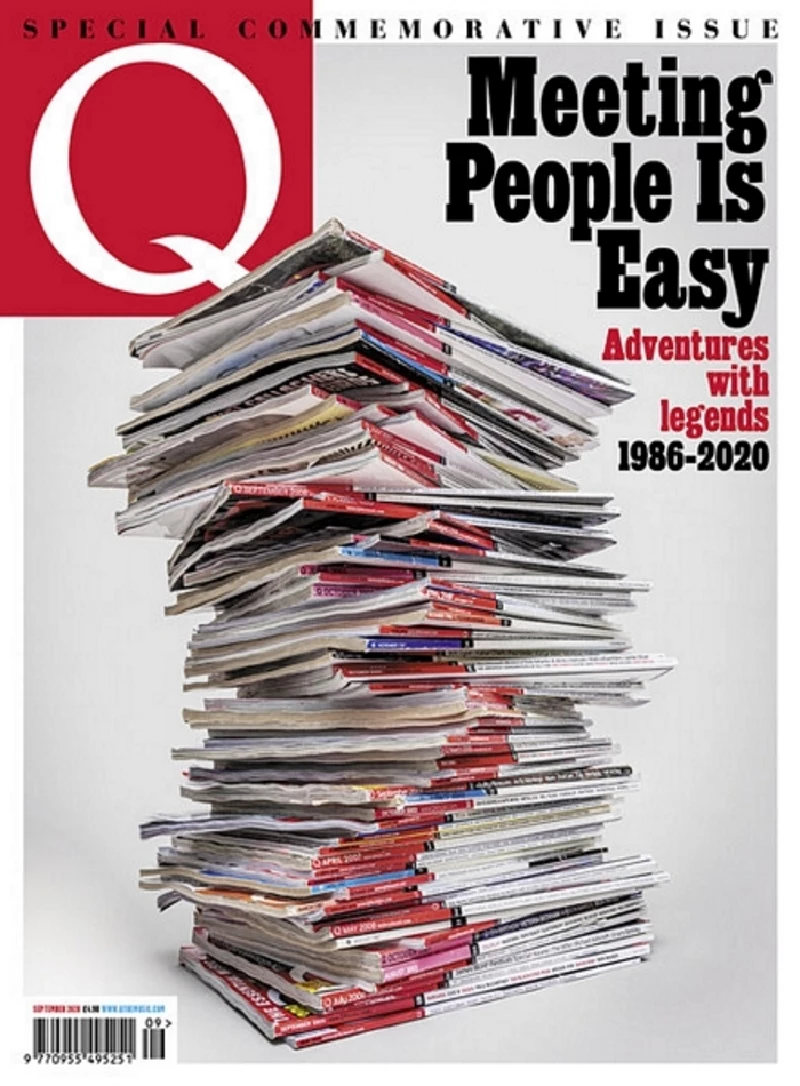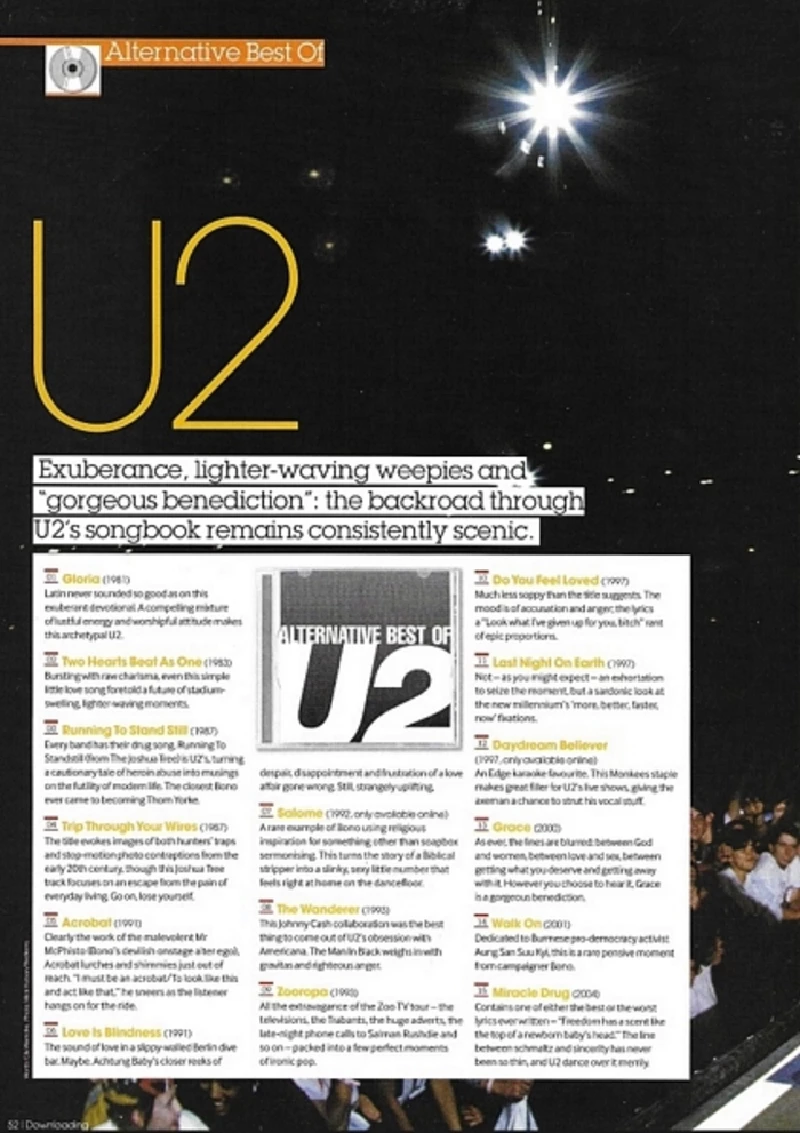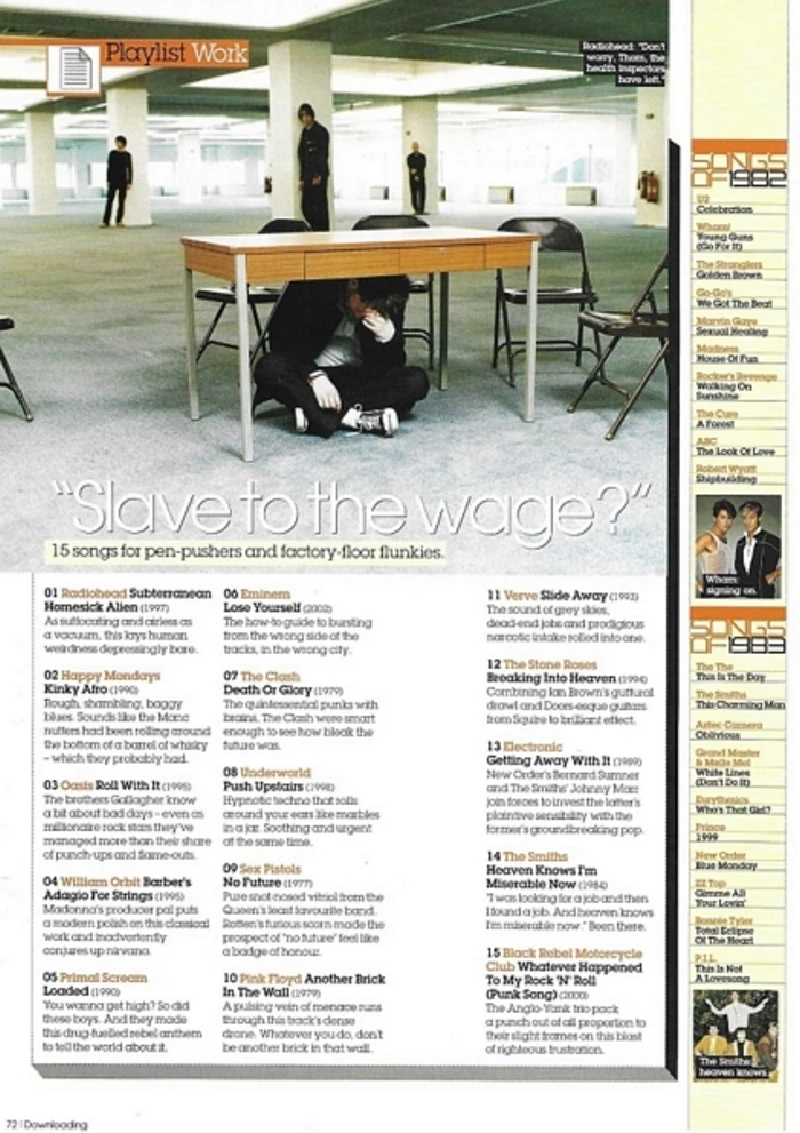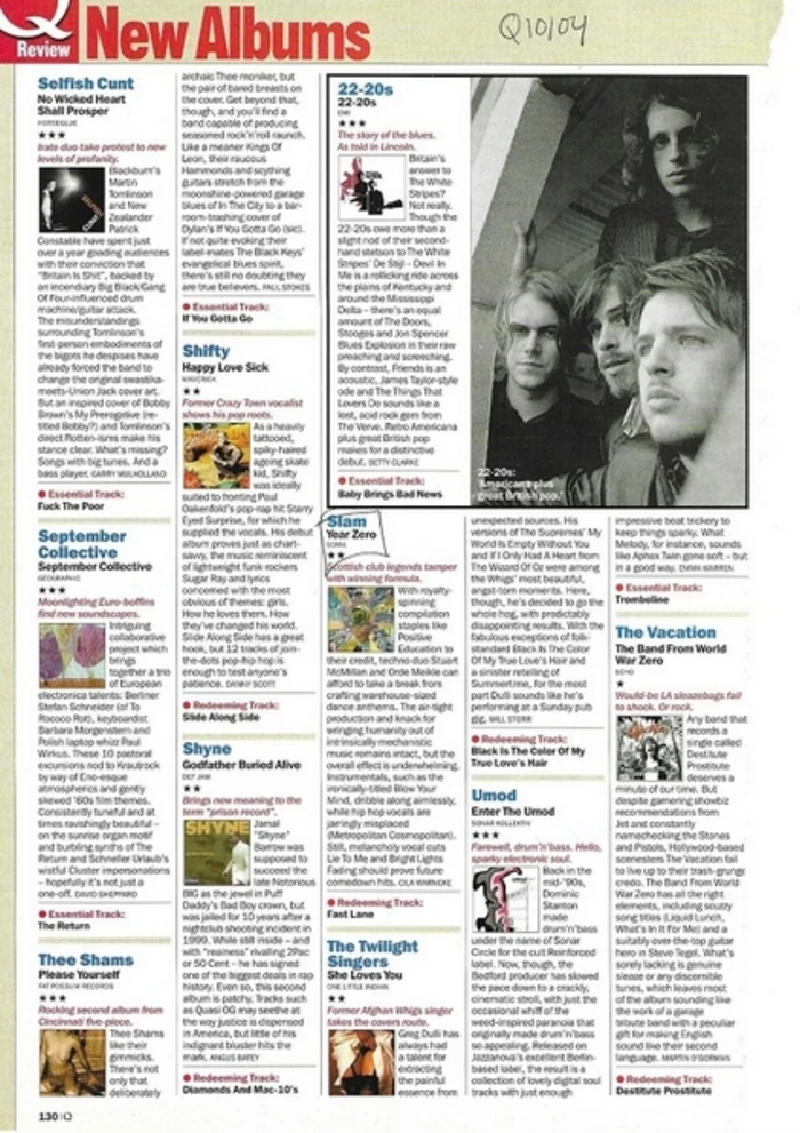Miscellaneous - Top 10+1 Reasons Q was the Best Music Mag of its Generation
by Cila Warncke
published: 9 / 9 / 2020

intro
The news that Q magazine was closing this year after a 34-year run due to Covid-19 sent shock waves through the music community. Ex Q editorial assistant Cila Warncke talks to other former work colleagues about their fond memories of the influential magazine.
On 20 July 2020 news broke that Q magazine was closing after 34 years as Britain’s most distinctive (and usually best-selling) music publication. Circulation had “fallen to 28,000 per month from a peak of 200,000 in 2001," the BBC reported. Covid-19 was the final straw. Q became another casualty of a disease that has brutalised the music industry. Q’s last editor, Ted Kessler, wrote, in a moving account of his sixteen years on the magazine: “By God, the last five years or so have been the greatest of my working life. The harder the economic climate, the more devoted we’ve become to the cause of great stories about good music. The full-time staff roster now is much less than half the size of that which I joined, but we are so much more productive, largely because we’re happier. You do good work when you’re happy, and doing good work also makes you happy.” Kessler strikes a note familiar to Q readers and contributors alike – it was a magazine that made people happy. Its mix of peerless journalism, striking photography and irreverent humour was unlike anything else on the news-stands. As Q’s editorial assistant from 2001-2005, I had the privilege of spending time with a group of smart, talented, cavalier-about-everything-except-the-work staffers, freelancers and workies who made up the Q milieu. Four ex-colleagues kindly took the time to share their memories of the top 10+1 reasons why there will never be another magazine quite like Q. Steve Peck – photo editor + director of photography Andy Welch – work experience regular + freelancer Paul Stokes – staff writer, freelancer, news editor, web editor + freelancer Anthony Dhanendran – work experience + holiday cover + CD cover-mount model 1.Irreverence Anthony: “The appeal of Q was that the whole thing was tongue-in-cheek. Not unkind, but not taking itself, or the artists, very seriously either.” Q had a decided (if at times school-boyish) irreverent streak carried over from founding editors Mark Ellen and David Hepworth’s tenures at pop bible Smash Hits! Essentially, Q operated on the principle that it was okay to take the piss out of famous people – the more self-important, the riper for take down. The logical extreme of this may well have been the once-seen-never-forgotten photo shoot featuring peak-Tantra-era Sting pulling yoga poses in white y-fronts. Wit and wordplay were next to godliness. Writers invested even 120-word album reviews with memorable turns of phrase. Martin O’Gorman once described a hapless rock outfit as “a garage tribute band with a peculiar gift for making English sound like their second language”; Angus Batey observed of a hip-hop artist: “full marks for trying, but that’s the only area he scores them”; while Emma Warren praised a record for, “crackling with the ennui and cattle-pen frustration of people who really hate their day jobs.” 2. Quality Andy: “It was proper music journalism – good access, good photos, good journalists writing brilliant articles. There was no secret formula, it was just quality.” Behind the cheeky facade, Q was serious about the work. My interviewees demonstrate how time at Q developed serious journo chops: Steve spent nine years at Wired before taking over as senior editor at News UK’s Bridge Studio; Andy was TV and music editor for the Press Association, and a journalism lecturer, before joining the Guardian; Paul freelanced between regular stints at Q and produces on BBC 6 Music; and Anthony worked for BBC Good Food and Top Gear, and of course Pennyblackmusic. Other notable Q alums include Guardian music critic Alexis Petridis, Observer Food Monthly deputy editor Gareth Grundy, Guardian Weekend deputy editor Rob Fearn, author and broadcaster Stuart Maconie, Guardian columnist John Harris and prolific journalist and author Dorian Lynskey. The proclivity to move on to the Guardian/Observer suggests something meaningful about Q’s socio-political slant, too. Its embrace of the rock’n’roll values of freedom, rebellion and sticking up for the underdog was more than a posture. Notably, the last time Anthony and I met was as part of a Q/Kerrang! contingent marching in the 2003 London anti-war protest. 3. Access Paul: “I remember interviewing Maria Mochnacz, who shot the cover of PJ Harvey’s Stories from the City, Stories from the Sea, chatting to her was a real moment of ‘Wow, I’ve gone from buying the record to talking to the person who made the cover.’” Steve: “The Q Awards were brilliant. Once, I was talking to The Edge and Jack White about guitars and just behind them were Bono, Matt Bellamy and Paul McCartney chatting – you don’t get those people in the same room. It was mental.” It’s easy to forget that less than 20 years ago, artists had a modest number of promotional outlets, such as newspapers and magazines. Forget 30 minutes on the phone or a seat in a stage-managed Q & A overseen by minders; Q editors could, and did, insist on quality time with artists. The result was, often as not, singers lulled or charmed into saying things that would never emerge in a potted one-hour conversation. Paul recalls schlepping around Spain for a week with the then newly famous Libertines: “Pete was being a real dick, reading me his diary and stuff, until I mentioned we supported the same football team – then suddenly he was like, ‘How can I help you mate?’” 4. Images Steve: “Nadev Kander – my favourite photographer ever – shot Boy George and Michael Stipe for us. The Bowie/Moss shoot with Ellen von Unwerth. I got to work with Rankin. Søren Solkaer...” Anyone who read Q will have a mental list of memorable pictures, like the aforementioned David Bowie and Kate Moss cover that featured the naked supermodel draped over a natty Thin White Duke. As with the writing, photography was characterised by fierce attention to detail and determination to capture the essence of the artist in the most Q way possible. “There’s an absurdity to it all, when you’re in a position to be working with those people,” Steve said. “I never asked for autographs or pictures but I’ve got my memories from those shoots. We were professionals, working together to make great images.” 5. Nurturing talent Andy: “Q had an impact on me as a writer. Those big lengthy features… getting good quotes out of people – that came from Q. That’s what I emulate in my work. I wasn’t interested in [being a] ‘superstar journalist’ I was interested in what the interviewee had to say. ” Paul: “If it weren’t for Gareth [Grundy, then news editor] I probably would have never made it as a writer. He made me write and rewrite and rewrite. If it weren’t for my time at Q, I wouldn’t have had the career I’ve had.” Anthony: “Q is where I learned how to write. After working there, I spent ten years as a writer. It’s where I learned the non-seriousness, the light touch on the prose.” Steve: “It changed my idea of what a job could be. I never expected to get a job in journalism. Working there showed me it could be a career, and it still is.” 6. Timelessness Paul: “The thing that got me back into pop was Elvis Costello and the only place you could read interviews with him was Q. It was eye opening. [Q] would mix older artists with people like Jarvis and Damon. Other music magazines were focused on the coolest thing of the moment. Q transformed the music press by saying, you can listen to old music. Just because someone has been around 20 years doesn’t mean they don’t have anything to say.” For example, the August 2003 issue featured Johnny Cash, who passed away the following month, along Robbie Williams, Lisa Marie Presley, Dizzee Rascal and Stereophonics. This was typical; the June 2002 issue found Kylie Minogue rubbing shoulders with John Lydon, Ozzy Osbourne and Doves while January 2004 featured Justin Timberlake, Ricky Gervais, Tori Amos and Blur among others. 7. Fun Steve: “The team was fun. You were expected to go to the pub. No one seemed to care if you turned up hungover, as long as you got the job done. It was a cool place to be.” Anthony: “Work experience was fun. The office was really friendly. The people were there as you’d find them in the pages of the magazine.” Paradoxically or not, Q’s seriousness extended to leading by example in its role as arbiter and champion of rock’n’roll mischief. There were (apocryphal I’m sure) stories of previous editors enjoying powdered breakfasts but by 2001 it was all strong tea and Nescafe Instant. Still, there was a permanent stash of Carlsberg in the corner of the office, and a sense the odd tear up to be embraced, not censured – particularly at the Q Awards. 8. Passion Andy: “I worked on a Radiohead special edition. [Editor] Mark Blake let me loose in the archive, going through back issues, looking for features. For the next two weeks I sat at a desk and typed out those features. I was so happy to be there, sitting typing out Radiohead interviews from 10 years previous. It was a pleasure.” Much of Q’s appeal to readers lay in the fact its writers wanted to be there and the bands wanted to be in it. At its best, the magazine was a jolly conspiratorial celebration of music, booze and mild misbehaviour. It also effectively conveyed the message it would stop at nothing to get the perfect quote or picture or moment – however silly. Anthony: “They were prepping an issue with a CD of the year’s hottest tracks, and wanted a photo of someone holding the CD as if it was really hot. I got on the 73 bus and went to a costume hire shop on Balls Pond Road to get a radiation suit. When I got back [then editor] Danny [Eccleston] said, ‘Can you wear it for the shoot?’ “So I went down to a studio in Clapham and spent the morning being shot in that suit, holding the CD. The first and last time I appeared as a cover-mount model.” 9. Creativity Anthony: “One of the things I most loved were the features that weren’t about artists. They used to have great features on things like gig memorabilia or backstage catering. Once someone got sent to a local pub with a load of 50ps, spent 12 hours feeding the jukebox, and made it into a feature.” Paul: “Even as a junior writer who didn’t get near features, I got to do wonderful things like getting Method Man to talk about how to childproof a house. It was carte blanche to be close to what was going on in music.” 10. Broadening musical horizons Steve: “The music I liked didn’t feature much in the mag, I was into more electronic music. But the Killers first single was always on the playlist, ‘Somebody Told Me’... And I thought the Arctic Monkeys’ first album was great.” Anthony: “I bought my first Q because it had a CD. Nirvana was on the cover and the CD had U2, Gin Blossoms, Stereo MCs – it was great. I listened to it a lot.” Andy: “Q was the first place I read about Dennis Wilson’s 'Pacific Ocean Blue' – before it was reissued when it was hard to get a hold of. I went and spent 100 quid on a vinyl that I still have, still listen to.” Paul: “I went to Korea to interview Metallica – which was wasted on me, I am not a metal fan, not a Metallica fan. They invited me to watch the show from this riser on stage, and halfway through James tapped me on the shoulder and said, ‘How do you think it’s going mate?’ ‘Um, good, mate!’” 11. Keeping Bono busy Paul: “The band I most associate with Q? The obvious answer is U2, they are kind of the Q house band.” Steve: “U2 was the biggest band for the magazine, but they weren’t my favourite.” Anthony: “Is it fair to say U2 is a Q artist? They used to always win the Best Band in the World Award.” However much time someone spent at Q, or in what role, they concur the magazine had a special bond with Bono and co. When I arrived in 2001 U2 (already a decade past the dizzy high of Achtung Baby) scooped the People’s Choice Q Award. Over the years, U2 appeared in the magazine as regularly as page numbers. It was a relationship that endured, with Bono weighing in at the last: “I’m gonna miss it… It had everything I want from a music mag. All the serious and all the silly... The scholarship deftly done.” Check out the Q website’s Almost Famous series – writers’ funny, artful, poignant reminiscences about life behind the scenes. The final Q is on news-stands now. Print and digital copies of back issues and the final issue can be ordered via Great Magazines.
Picture Gallery:-




most viewed articles
current edition
Shrag - Huw Stephens Session 08.12.10 and Marc Riley Session 21.03.12Gary Numan - Berserker
Razorlight - Photoscapes
John Hassall - Photoscapes
Max Bianco and the BlueHearts - Troubadour, London, 29/3/2025
Primal Scream - Photoscapes
Roberta Flack - 1937 - 2025
Waeve - Club Academy, Manchester, 18/3/2025
previous editions
Heavenly - P.U.N.K. Girl EPManic Street Preachers - (Gig of a Lifetime) Millennium Stadium, Cardiff, December 1999
Boomtown Rats - Ten Songs That Made Me Love....
Beautiful South - Ten Songs That Made Me Love...
Barrie Barlow - Interview
Oasis - Oasis, Earl's Court, London, 1995
Trudie Myerscough-Harris - Interview
Dwina Gibb - Interview
Pixies - Ten Songs That Made Me Love...
Doris Brendel - Interview
most viewed reviews
Pennyblackmusic Regular Contributors
Adrian Janes
Amanda J. Window
Andrew Twambley
Anthony Dhanendran
Benjamin Howarth
Cila Warncke
Daniel Cressey
Darren Aston
Dastardly
Dave Goodwin
Denzil Watson
Dominic B. Simpson
Eoghan Lyng
Fiona Hutchings
Harry Sherriff
Helen Tipping
Jamie Rowland
John Clarkson
Julie Cruickshank
Kimberly Bright
Lisa Torem
Maarten Schiethart